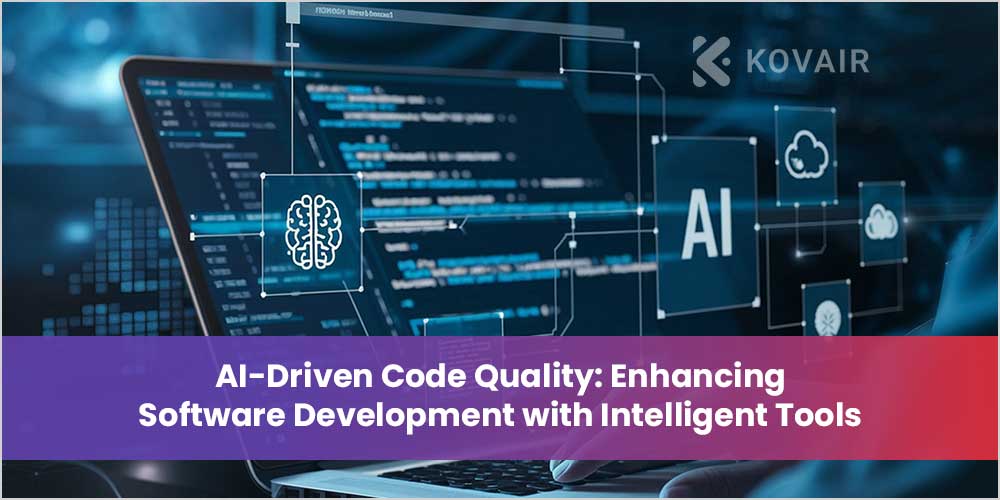
In today’s highly competitive digital environment, speed and quality in software development are no longer trade-offs; they’re expectations. Developers must complete work on code that can scale and be free of mistakes before deadlines. The limitations of traditional techniques are being overcome by AI-based tools that are transforming how companies approach software development and management.
Decision Intelligence is the strategic bridge between AI-powered insights and human judgment. It empowers software teams to make better, faster, and more reliable decisions about code quality, technical debt, and release management. Explore how AI and Decision Intelligence transform software development into a smarter, more data-driven discipline.
The Challenge of Maintaining Code Quality at Scale
Maintaining a high-quality codebase becomes increasingly challenging as a team grows, the project expands, and deadlines approach. For a long time, examining code by hand, using static analysis programs, and testing it by hand have been standard, but these methods have many gaps:
- Delayed detection of issues
- Subjective code reviews
- Inability to predict downstream risks
- High cost of fixing bugs late in the cycle
That’s where AI-driven code intelligence comes in, offering context-aware analysis, real-time feedback, and pattern recognition at a depth no human reviewer can match.
What Is AI-Driven Code Quality?
AI-driven code quality refers to the use of artificial intelligence and machine learning algorithms to analyze, optimize, and maintain codebases. These tools go beyond syntax checking or linting — they evaluate code behavior, structural patterns, risk hotspots, and team collaboration dynamics.
Examples include:
- ML-based bug detection
- AI-driven static code analysis
- Automated test case generation
- Predictive risk scoring for code changes
These tools don’t just identify problems, but also prioritize them, offer smart fixes, and learn from past issues to guide future development.
How Decision Intelligence Powers Smarter Development
Decision Intelligence (DI) is the application of AI, analytics, and domain knowledge to help developers and tech leads make data-backed choices. Instead of reacting to issues, teams using DI frameworks can proactively optimize workflows, manage technical debt, and balance code speed with stability.
Major Advantages of DI in Software Development
- Improved Allocation of Resources – AI picks out modules that pose the most risk so engineering managers can give their attention to the most important issues.
- Assessing Risk Using Predictive Coding – With DI tools, issues are highlighted during the code review phase instead of showing up later.
- Continuous Quality Monitoring – Real-time dashboards help track key quality indicators — from cyclomatic complexity to unit test coverage — ensuring standards are consistently met.
Real-World Use Cases
1. Automated Pull Request Reviews – Modern CI/CD pipelines are now integrating AI tools that automatically review pull requests for security flaws, code smells, or style violations, reducing bottlenecks and improving code hygiene.
2. Intelligent Test Optimization – By analyzing which tests apply to new code, AI tools can provide quick feedback and reduce the time spent on unnecessary tests.
3. Modernizing Legacy Code – With AI, it is possible to assess large pieces of old code and suggest methods to break them into modules, remove unnecessary parts, or update to a different framework.
It enables teams to select activities that yield the most significant benefit from engineering investments.
Future Outlook: Moving from reactive development to proactive development
The future of software engineering lies in proactive decision-making. With these tools, groups are ensuring that problems are caught and prevented early.
By integrating intelligent code quality tools into the software development lifecycle, businesses gain:
- Better ability to move quickly and think creatively
- Lower deployment expenses
- Higher product reliability and customer trust
- A scalable approach to talent development and onboarding
Final Thoughts
The move toward AI-enhanced software engineering isn’t a trend — it’s a paradigm shift. Tools powered by AI and Decision Intelligence are not only improving code quality but also reshaping how development teams collaborate, prioritize, and ship products.
If your organization is looking to reduce bugs, accelerate releases, and improve developer experience, it’s time to integrate Decision Intelligence into your development lifecycle. Ready to upgrade your code quality with intelligent decision-making?
Explore how our Decision Intelligence platform can embed smart thinking into every line of code.
